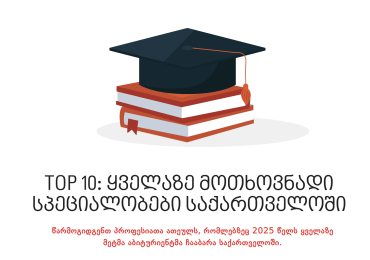This article is based on my recent research, which evaluates the ongoing leadership practices in Georgia, and identifies the top-five managerial challenges of Georgian leaders in every sector. The research deeply analyzes the root causes of these challenges, and offers progressive solutions based on primary research data obtained from qualitative (interviews) and quantitative (questionnaires) methods, as well as secondary data based on literature related to international best practices.
According to 64% of those surveyed, the number one managerial challenge of Georgian leaders is time management, planning, and organization.
If we listen to time management gurus, it is impossible to plan for the future without having an objective perception of the present. The ‘synchronic’ nature of Georgian culture plays a significant role in terms of the incorrect time perception and management on the part of Georgian leaders. It is acceptable in our society to administer several tasks simultaneously or synchronically (multi-tasking, changing plans because of specific people, and placing personal relationships above rules and regulations). When time is not perceived objectively, it results in the gradual loss of control over ongoing events. In such cases everything becomes relative as opposed to absolute for any person. The inability to control ongoing events triggers a mechanism whereby blaming everything on other people or forces and being dominated by external Locus Control results. Therefore, typical Georgian leaders are oriented not on action, but rather on reaction, which is forcefully caused by outside factors pressuring them in real-time. As a result, time is wasted on micro management and low impact decision-making.
According to the research, one of the most productive steps to counter this tendency would be to switch to the western ‘sequential’ model of time perception and management, which is more practical in terms of doing business. It dictates that the habit of multitasking be minimized as much as possible, and instead opting to administer one task for each time slot. Under such a model it is also unacceptable to make exceptions for specific people, and personal relationships are never elevated above the rules and norms. The next logical step is to strengthen introspection, self-discipline and self-control mechanisms. If one’s own behavior patterns and tendencies remain unlearned and unobserved, the risk and probability of repeating the same behavior and mistakes increases exponentially. The next step is to understand that any success or failure is based on one’s abilities and attitudes, as well as the product of their own decision making and behavior, which in turn means internalizing Locus Control.
In order to address planning problems, a leader must first be motivated to use their own time effectively. The proper process begins with considering all of the people and factors involved in the planning process. A leader will discover that it is impossible to change the big picture through micro management and still do everything on time. Hence, one must learn to prioritize. The most famous method of prioritizing is Stephen Covey’s Time Management Matrix, which underscores the importance of prioritizing tasks in the following order: important and urgent, important and not urgent, urgent and unimportant, and unimportant and not urgent.
A leader’s habit of blaming everything on other people and outside factors serves disorder. It gives them the illusion that even if things are planned, other people or forces will intervene and such plans will not see the light of day.
In addition, according to the research, unnecessary people and things play a significant role in the life and work of a typical Georgian leader. In order for a disorganized person to organize their own life and work, they must first say ‘no’ to everyone and everything not serving productivity. It is also necessary to organize and catalogue one’s own physical and digital things, and attach their ends to a constantly synchronizing general form of order, which is easily accessible, controllable, and editable. In order to reach the high end of productivity, it is also imperative to divide a day into creative and administrative blocks of time. The final step is to require the constant evaluation and advancement of one’s own methods of time management and automating processes in order to minimize personal intervention in them.
According to 56.3% of those surveyed, the number two managerial challenge for Georgian leaders is listening to others and taking into consideration competent advice
The research shows that inferiority complexes are a significant contributor to such problems among Georgian leaders. These are constantly demonstrated through the building of pyramids of complete obedience via their autocratic management style. Cultural trends like nepotism and High Power Distance also play a significant role in this direction. In addition, we must consider the fact that unlike the West, where personal and professional growth are priorities, our post-Soviet society craves the accumulation of money, status, and power above all else.
Georgian leaders must understand that if they do not listen to others, they will lose touch with reality, which halts personal and professional growth. Before a person is appointed or elected to a leadership position, we must look over their past and try to understand whether the motivation that has fueled them to this milestone of success is healthy or not. It is dangerous when a person that has yet to overcome this complex, is given a chance at a leadership position, and even more so dangerous if he or she is incompetent and the appointment is not merit-based. Such an instance can fuel the leader’s vanity and fear of competition, while triggering the process of hiring incompetent and weak-willed employees in order to hide their own incompetence through oppression, silencing, and shaming them.
It is imperative for such a leader to understand that education is a social process and different opinions, healthy discussion, and criticism are all cornerstones of success. A subordinate to whom leaders do not listen, feels oppressed, disempowered, and demotivated. However, if a subordinate knows that someone is listening, then they bring new ideas, which diversify the knowledge, vision and skills of a leader. The key to overcoming this challenge is to adequately address such cultural and social obstacles. This can be achieved by decreasing power distance in the society, uniformly fighting nepotism and patronage, condemning unhealthy values such as the accumulation of money and power, while promoting accepted leadership values around the developed world, raising the quality of education, as well as personal and professional growth based on best practices.
We must also not forget that asking for help and advice is considered a weakness within Georgian culture. In addition to practical inexperience, local leaders often lack theoretical knowledge, and instead of seeking help and advice, it compels them to switch to the “leader knows everything and is always right” mode. Such a tendency fuels and validates the dominant system of nepotism and patronage in the country.
According to the research, the first step on the road to overcoming this challenge is defeating vanity, envy, and fear of competition, which is almost impossible without overcoming the inferiority complex. During the next stage, a leader must understand that knowing everything is not necessary, and true leadership is achieved through education based on critical thinking, saying no to nepotism and empowering others. The development of critical thinking is first of all achieved through listening to others and considering competent opinions and advice. In addition, it is important to exit the comfort zone created by the influence of local culture and mentality, and to start looking at things from the global perspective; developing interest groups and professional networks, maintaining gender balance, and raising levels of emotional intelligence. All of these can play a crucial role in this direction.
According to 48.9% of those surveyed, the number three managerial challenge of Georgian leaders is lack of vision, and a lack of long and short-term goals
The research made it evident that an absence in collaboration with regard to forming an organization’s vision is the main reason behind the existence of this challenge. We must also consider the fact that the business environment was always unstable in Georgia’s post-independent history, which has led to a fear of embracing a long-term vision. This is largely because of a narrow planning horizon. Even if someone had formed a long-term vision in business, it would be impossible to know what would happen when a new government came to power – the state could place pressure on any business or even drive it out of the market.
The main key to forming a vision for an organization is the appointment of a competent person to a leadership position. That is because they can assess risks objectively and understand when changes need to be made. It is also necessary for leaders to borrow from globally-established best practices. In the western developed business world, the correct vision is associated with a ‘core ideology’ that outlines core values, a core purpose and an ‘envisioned future’, which outlines 10 to 30 years BHAGs (Big, Hairy Audacious Goals). A leader must understand that all of this is impossible to attain for an organization without the full involvement of human resources, which goes together with the famous saying: “find out where your team is headed and lead it there.”
Bryan Tracy claims that there are four reasons that people do not set goals:
1. They are not serious about achieving things
2. They don’t understand the importance of setting goals
3. They don’t know how to set goals
4. They fear rejection in the case of failure
In order for the vision to be most effective, it is necessary to be oriented specifically on long-term goals and to embrace the objective assessment of the advantages provided by having such goals, as well as having the ability to handle the fear of possible public criticism. It is also important to depoliticize the private sector, which in turn will provide independence for the Georgian business and orient it on long term goals. Such condition would broaden the planning horizon of leaders, while shifting their focus to free market trends only. The last step is to adopt the most famous goal setting criteria in the modern developed world– the SMART criteria – which are outlined by Peter Drucker and George Doran. SMART is an acronym for goals that must be Specific, Measurable, Attainable, Relevant, and Time bound.
47.2% of the surveyed think that the number four managerial challenge for Georgia leaders is not admitting their own mistakes and not learning from them.
According to the research, typical Georgian leaders hide their mistakes in order to avoid shame and guard their authority and public image. They also don’t ‘waste time’ correcting their mistakes. Other causes of this challenge include the inferiority complex, emotions-based management, lack of pragmatism and diplomacy, avoidance of responsibility, the illusion of knowing everything, an inability to analyze the past objectively and the inability to see the benefits of apologizing, which happens to be the best way of admitting a mistake. The process of apologizing consists of four parts: admitting the mistake, taking responsibility, expressing regret, and making a promise that one will not make the same mistake again.
Very often, apologizing is perceived as an act of weakness within Georgian society, because of high Power Distance. Hence, Georgian leaders often try other methods to correct their mistakes. They display habits such as avoiding responsibility and placing blame on others. As a result, the situation changes temporarily and shallowly – but anger remains within the hearts of subordinates, coupled with the sense of feebleness, and most importantly – demotivation, which sets the leader up for self-destruction in the long run.
The research also sheds light on the fact that even the very few Georgian leaders who admit their mistakes, are unable to learn from them, because they do not analyze the mistake objectively. Such leaders continue to make the same mistakes in the future because they are often dominated by external Locus Control.
When a leader admits to making a mistake, the next step is to objectively analyze its causes, as well as the leader’s own role in the affair. If a leader does not analyze a fact of the past objectively, there is the danger that it might stay in his memory as his own interpretation of a fact. According to a theory by McGill University Professor Henry Mintzberg, only after analysis and objective assessment can a mistake be called an experience. That is how a leader should turn every occurrence into wisdom. Georgian leaders need to understand that mistakes are very human parts of the learning process, and they must be evaluated through internal Locus Control.
According to 45.5% of those surveyed, the number five managerial challenge of Georgian leaders is incompetence (irrelevant skills, education, and experience).
One of the main reasons of the typical Georgian leader’s incompetence is the fact that they take on leadership positions not because of their skills, talents, or merits – but rather as a result of nepotism and patronage, which are the main ways of achieving success in Georgia. The dominant value system in our country rewards dependence on others through loyalty, instead of independence and merit based on hard work. In addition, the absence of a gender balance in leadership positions negatively contributes to leadership practices in Georgia. That’s because trendy nepotism and patronage greatly favor men over women. The inability of Georgian leaders to make decisions also stands out, since their mentors never empowered them to make decisions in the past: as followers they were only told what to do.
According to the research, in order to avoid having incapable, unskilled, untalented, and unmerited leaders, as well as nepotism and patronage systems in the selection process, it is absolutely imperative to start rewarding individual work, achievement, competence and motivation for self-actualization, switching to internal Locus Control, and empowering others in the Georgian business environment.
The following skills are a must in order to make sure a modern leader is successful:
1. Context – to grasp the constantly changing global business environment through economic, political, and social trends
2. Complexity – to understand the opportunities, risks, and challenges such trends facilitate
3. Connectedness – to see though all of the actors and stakeholders in the process and build bridges among them.
As for the education problem, the research clearly shows that there is a lot of demotivation to obtain an education because of the nepotism and patronage that are dominant in the country. We have limited scholarships to study abroad, we use experiments instead of adopting the world’s best practices, and even if we do adopt such practices, we do it through the copy-paste method (which just does not work), rather than adjustingforeign practices to the Georgian context.
The local schools must be able toprovide elementary business education that will underscore the equal importance of three priorities in any business:
1. Customers
2. Shareholders
3. Employees
It is also imperative to know and understand the three main parts of business projects:
1. Budget
2. Quality
3. Timeline
It is a trend in Georgian to appoint persons with irrelevant experience to leadership positions, which means that they will have irrelevant ideas and will recruit irrelevant subordinates, which will give them more irrelevant ideas and set up the organization to become a “servant” of irrelevance. Such leaders are of course selected through nepotism and patronage, and they possess the unproductive Soviet mindset, which is directly linked to accumulating and retaining power and the status quo while avoiding personal responsibility. At the same time, Georgian organizations and institutions are weakened and attached to specific cult-like personalities. As soon as these individuals leave their positions, the organizational structure ceases to function.
There are several tested methods of fighting against the recruitment of leaders with irrelevant experience. These methods include strengthening institutions and organizations and freeing them from the influence of specific persons; delegating and empowering mid-level management; intensively getting involved in intercultural dialogue, and the development of the premise of bridging social capital in the country.
With regard to the more general factors, it is absolutely crucial to accelerate economic growth in order to facilitate a healthier, more competitive business environment, which in turn will create the demand for more advanced leadership practices in Georgia.
















